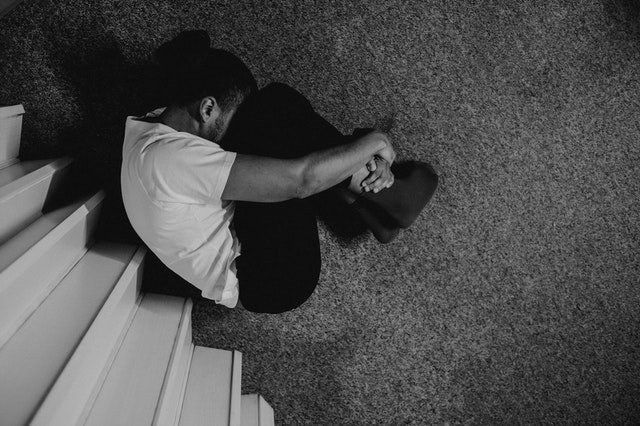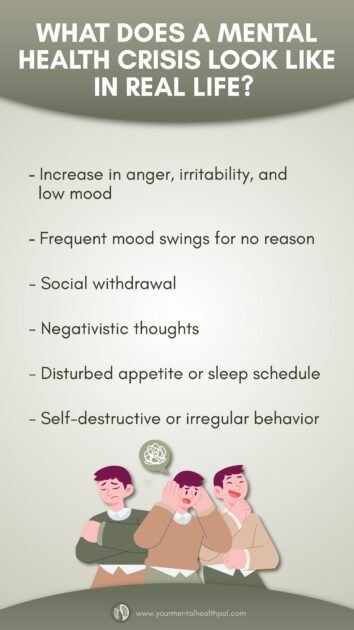It is normal and perhaps even necessary to feel sadness, discomfort, and exhaustion. However, when these feelings become prolonged or overwhelming, it is a sign that something is not correct.
According to the National Alliance on Mental Illness(NAMI), 21% of adults in the USA have mental illness yearly. But what does a mental health crisis look like? And how can you avoid such conditions?

What Does A Mental Health Crisis Look Like In Real Life?
NAMI defines a mental health crisis as, “any situation in which a person’s behavior puts them at risk of hurting themselves or others or prevents them from being able to care for themselves or function effectively in the community.”
From the definition mentioned above, one can understand mental health crisis signs, but there are also many hidden or subtle symptoms of a mental health crisis. Learning the mental health crisis signs can help you identify what does a mental health crisis look like. It can also help you understand when you, your loved ones, or others around you need help.
While these signs indicate a crisis, they can also be caused by regular stress or other medical conditions. With proper self-care and self-regulation, you can overcome them in daily life. What does a mental health crisis looks like can be influenced by different factors. So without further ado, here are some indicators of poor mental health:

1. Irregular Emotions
People with mental health conditions might have irregular emotions and emotional expressions. For example, they might experience prolonged feelings of Irritability and anger. Or they could suffer from extreme fear, stress, worry, emotional exhaustion, or sadness. Frequent mood swings for no reason might also be typical.
These emotions might overwhelm a patient, leading to a loss of interest in activities, low mood, and depression lasting more than two weeks. In extreme conditions, they might lead to psychosis, delusions, and being out of touch with reality. Emotional expression can also be a problem.
2. Social Withdrawal
Difficulty understanding and relating to other people could lead to social withdrawal. Doing nothing for long periods, losing friends, dropping out of activities, suffering the impact of loneliness, and declining productivity in the workplace or school can fasten the process of isolation.
3. Disturbed Thoughts
A person undergoing a mental health condition might experience an inability to concentrate and cope with minor problems. They might start thinking of irrational statements, using peculiar words or language, excessive fears or suspiciousness, and paranoia.
4. Changes In Behavior
A mental health crisis can lead to irregular sleep(insomnia, sleep deprivation, etc.) and appetite. It can also lead to hyperactivity, inactivity, or alternating between the two. Forgetfulness and loss of personal possessions, weight gain or loss, not sleeping, and unusual sensitivity to light and noise are different symptoms of such crises.
Such conditions can also lead to self-harm, agonizing, destructive, violent, suicidal ideation, and anti-social behaviors.
What Are The Types Of Mental Health Crisis?
A mental health crisis can be classified based on intensity, age, or cause. For instance, you could have a mental illness that causes a mental health crisis while someone else experiences the same due to changing living conditions.
What Does A Mental Health Crisis Look Like For Teenagers?
Adolescents could also experience a mental health crisis differently. For instance, they could have a decreased appetite, nightmares, stomach pain, and other physical symptoms for no apparent reason. They could have clinging, worried, fearful, and repressed(childhood) behavior, leading to family and education issues.
Now that you’ve learned what does a mental health crisis look like, let’s understand how to identify mental health crisis signs in yourself next.
How Do I Know If I’m In A Mental Health Crisis?
While you know the signs of poor mental health, it can be challenging to identify the same within yourself. There are unique signs of bad mental health for everyone, but the following are a few primary symptoms:
-difficulty functioning or doing tasks you previously carried out with ease,
-self-medicating, harming yourself, or suicidal thinking,
-isolating and withdrawing from society,
-feeling irritable, angry, and violent,
-sudden or unexplainable changes in mood,
-paranoia, psychosis, hallucinations, being out of touch with reality, etc.
Causes of A Mental Health Crisis
To learn what does a mental health crisis look like, studying its causes may help. Learning the causes may also help you prevent the same for yourself and your loved ones. Essentially, mental health conditions are caused by stress that overwhelms a person. These can include:
-Traumatic events such as being involved in an accident or losing a loved one, natural disasters,
-Changes in relationships or life conditions such as moving somewhere, breaking up with your significant other,
-Substance abuse or change in medical or mental health treatment,
-Family or personal history of mental issues,
-Poor nutrition, lack of sleep, and chronic pain,
–Low self-esteem, negative bias(self-outlook), lack of social support,
-Losing a job, failing to achieve a goal, facing discrimination, etc.
How To Prevent Or Overcome A Mental Health Crisis?
1. Establish Supportive Relationships With Others
Good relationships with your family and friends are important. They serve as a reliable support system in times of need. Peer relationships at work can also improve happiness and engagement in work. You can enhance such relations by participating in social activities, spending quality time with your loved ones, and trying to meet new people. Showing gratitude and appreciation to your loved ones will strengthen your bond with them further.
2. Become Self-Sufficient And Take Better Care Of Yourself
A positive self-image and becoming financially independent can help a person overcome mental health-related issues. While the latter may sound unrelated to mental health, money can help you afford the freedom required to be happy. Skills like emotional regulation, coping strategies for stress, etc., can also reduce the risk of such conditions.
Self-care is a practice that can help prevent the need for medical or therapeutic help. In the contemporary world, it is an essential skill. Some ways to take care of yourself include doing nothing, meditating, socializing, and traveling(alone or in a group).
3. Develop A Positive Mental Attitude
Healthy optimism, a positive mental attitude, is based on a belief in oneself and a willingness to overcome obstacles. You can be more optimistic and positive by becoming more vital in body and mind. Some steps you can follow are:
-being mindful and involving yourself in the present moment,
-increasing your self-awareness,
-developing meaningful and supportive relationships with those around you,
-keeping a journal to record the things you’re grateful for, etc.
Instilling the mentioned skills within yourself or your loved ones can help prevent a mental health crisis.
Conclusion
In a nutshell, what does a mental health crisis look like?
A mental health crisis is a mental health issue that makes it difficult for a person to function and harms them or those around them. However, such problems are influenced by multiple factors. These include the emotions, biology, behavior, and social interactions a person has. For instance, mental health issues can lead to mood swings, prolonged periods of low mood, stomach aches, and social withdrawal, among other symptoms. However, tracking your condition and mental health can be challenging. You can refer to the list of recovery goals for mental health patients to make the process easier.
For more information on mental health crisis and premium products catered to your needs, subscribe to Your Mental Health Pal.

